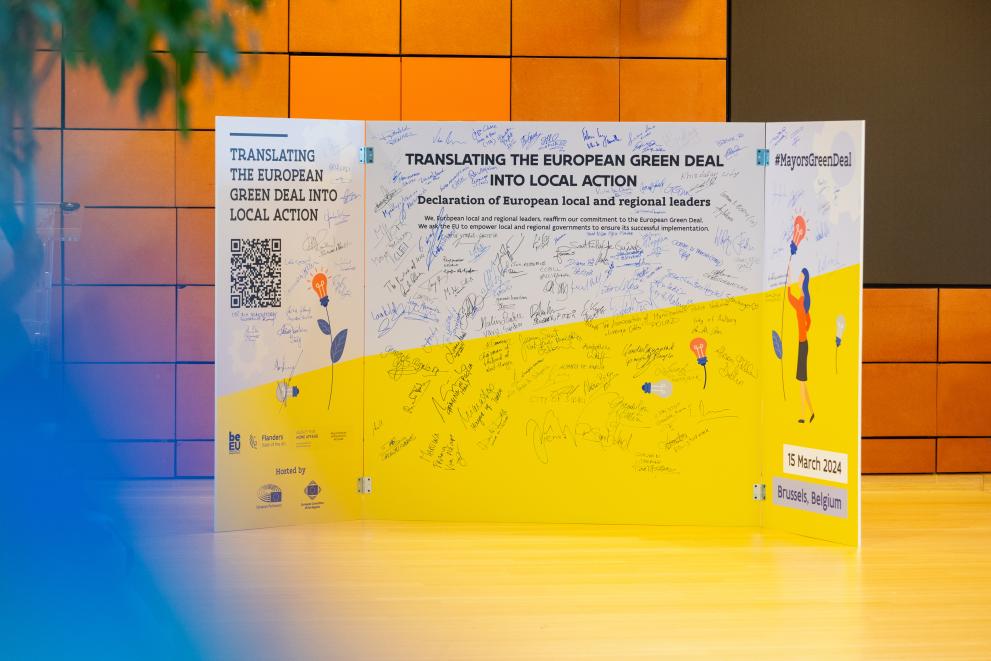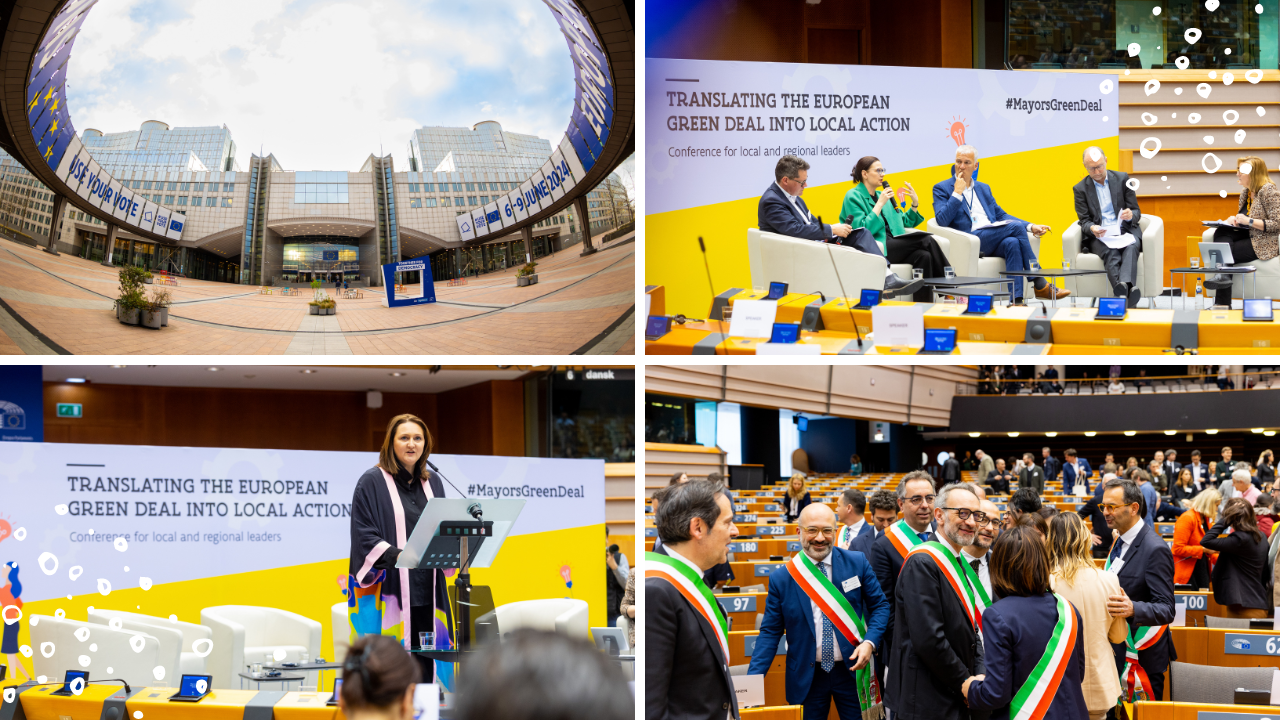
The European Green Deal is an ambitious policy striving to bring Europe to climate neutrality by 2050. After the big achievement of embedding the Green Deal into European law, comes the even bigger challenge of implementing it on the ground.
Europe faces a difficult road ahead: in a context plagued by misinformation, climate denial, and successive crises, how do you engage the millions of European citizens in the massive and collective endeavours of the Green Deal? How do you transform such an ambitious text into concrete action?
Responsible for more than 70% of Green Deal implementation, local and regional leaders hold the key. And they are keen on working with Europe to unlock the real potential of the EU Green Deal on the ground.
They made this clear on March 15th, at the conference ‘Translating the EU Green Deal into local action, gathering over 220 local and regional leaders at the European Parliament. Organised by the Flemish government under the Belgian Presidency of the EU Council, the event aimed to unify local and regional voices, in all its diversity, ahead of European elections.
Cities and towns at the heart of the European Green Deal
Throughout the event, mayors from various European cities and towns shared success stories, demonstrating the power of local leadership in driving climate action. Mayors referred to their role as “conveners” or “networkers”, crucially bringing together a wide range of stakeholders at local level to act on climate change.
Leuven's broad coalition building through their Leuven2030 initiative – where a shared governance model has city officials co-creating solutions with citizens, academia, businesses and more – is one example illustrating how cities can involve communities from the bottom-up into Green Deal policy.
Flanders presented its Local Climate Pact as a model for engaging communities in concrete climate action. Beyond the Flemish example, the event wanted to show the richness and diversity of European experiences, highlighting the importance of sharing them with one another to accelerate the green transition.
“When there is a good concept somewhere, use it, replicate it, and scale it up. We don’t need to reinvent anything. And Europe can help us. We need help to scale up our experiences, our good results, to the rest of Europe.” – Bart Somers, Mayor of Mechelen
Mayors exchanged with high-level representatives of the European Commission, exploring possible bridges between local experiences and European policies and programmes, as well as reinforcing existing ones. Local leaders stated that they were “fans of the European Green Deal” and that it was “their bible”, guiding the work they are doing at local level, whether through their Action Plans or Climate City Contracts.
By effectively bridging the Green Deal with strong local action as these cities are doing with their roadmaps, distant European policy becomes more tangible to the average citizen.
“If there is anyone capable of bridging the gap between abstract goals and clear results, between Europe and its citizens, it’s us, mayors.” - Gwendolyn Rutten, Vice-Minister-President of the Government of Flanders and mayor of Aarschot
The battle for the EU Green Deal… and democracy
This is a crucial issue, particularly in the current climate. With democracy facing escalating threats and misinformation alongside rising climate scepticism, there's an urgent call to make the Green Deal tangible through local initiatives. Mayors emphasised the need to communicate concrete outcomes and clear benefits of climate action to citizens, to avoid backlash and discontent.
In this sense, mayors are essential allies for the EU both to tackle climate change and to defend democracy.
“The battle for both the EU Green Deal and for democracy will be won or lost in the cities. (..) Bring your citizens on board, they are part of the solution. Translate the Green Deal into concrete words on the ground (…). If you neglect the territorial dimension in the Green Deal, you can raise the level of discontent.” – Emil Boc, Mayor of Cluj-Napoca, Romania
The city of Turku, Finland, for example, has achieved a notable reduction in emissions, with a remarkable 65% reduction in heating emissions over five years. Their progress has attracted growing investments in their carbon-neutral and circular economy. Bringing visibility to the economic benefits of their transition has helped get more stakeholders on board, accelerating the process.
“We need to show now that we are good at implementing. Delivering concrete progress on the ground. Delivering the benefits: the clean air, the safe and sustainable mobility, the lower energy bills.” – Matthew Baldwin, Deputy Director General of DG ENER, European Commission
How Europe can support and strengthen local action
As critical allies, local and regional leaders also took the opportunity to communicate clearly what they need from Europe to effectively implement the Green Deal. It’s no secret: local governments face a myriad of challenges. The EU has already set up a wide range of programmes, processes and initiatives to support them, but these can be finetuned, elaborated and strengthened.
Local leaders called on Europe to redesign effective multilevel governance processes in Green Deal implementation. This means the local level should be more actively involved in National Energy and Climate Plans (NECPs) through a permanent dialogue platform. EU decision-makers recognised the essential need to embed multilevel processes in Green Deal governance, aligning planning and funding efforts across all levels of government.
“We need to become much better at planning and multilevel planning, seeing NECPs as investment plans. Local authorities should be fully involved, to see what is needed locally, regionally, and nationally.” - Kurt Vandenberghe, Director General of DG CLIMA, European Commission
The mayor of Bitetto, Italy, and President of Anci Puglia, Fiorenza Pascazio, shared the example of Apulia regional government’s strategy to fight climate change with clear measurable targets involving the local level. A regional programme was set up to fund and support the development of local Action Plans via the Covenant of Mayors.
The other big topic was the need for more financial support, incentives, and a robust investment framework vital for implementing the Green Deal. Recognising that public funds cannot cover the entirety of substantial investments needed for Green Deal projects, mayors insisted on an investment system with appropriate regulations and guarantees, that could facilitate significant investments in large-scale projects.
Lastly, it was clear that in order to accelerate, it’s crucial to simplify the landscape of support instruments offered by the EU and national governments. Mayors called on the EU for more synergy of funds and programmes, and less bureaucratic hurdles.
All these elements are detailed into 10 concrete recommendations of the declaration, that was the centerpiece of the event. Signed by the attending elected officials, this declaration summarises the main messages, providing guidance for the upcoming European Commission to ensure effective implementation of the Green Deal.
Read the declaration

Detalii
- Data publicării
- 26 March 2024
